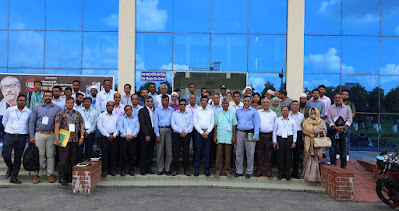To speed up the release of high-quality rice varieties in Bangladesh, seventy scientists from different research institutions and partners convened to discuss research findings and consolidate activities for 2023 during the Annual Review and Planning Workshop for “Development of Short-Duration Cold Tolerant Rice Varieties for Haor Areas of Bangladesh” on 10 October in Gazipur, Bangladesh.
Launched in 2020, this joint five-year research project of the International Rice Research Institute (IRRI) and the Bangladesh Rice Research Institute (BRRI), funded by the Krishi Gobeshona Foundation (KGF), aims to develop short-duration (120–140 days), cold-tolerant, and high-yielding varieties for the boro season. Dr. Mohammad Rafiqul Islam, IRRI’s project lead, presented 2021 achievements, including identifying 59 promising cold-tolerant rice lines for the Haor region by adopting cutting-edge breeding technologies. On the other hand, Dr. Partha S. Biswas, BRRI project lead, and the chief scientific officer (CSO) and Head of BRRI Habiganj updated the research progress of the previous season. He also outlined the plan for research activity in 2022. Mr. Dipok K. Chowdhury, Assistant Scientist (IRRI), also presented the market survey on rice value chain actors in the Haor ecosystem and the financial update by Ms. Tabia Sultana, Associate Manager (IRRI). Dr. Mohammad Mobarak Hossain, Assistant Scientist, IRRI moderated the session.
Dr. Md. Shahjahan Kabir, Director General of BRRI, emphasized the need to develop new short-duration and cold-tolerant Boro rice varieties and replace the popular ones such as BRRI dhan28 and BRRIdhan29. He suggested that the new varieties should mature before the last week of March or the first week of April so that farmers can harvest before the flash floods. He also commended the improved agronomic practices of the farmers in the Haor areas. “Exploring the scope for supplemental irrigation, timely weeding, and efficient application of potassium fertilizer could significantly increase rice yield in the Haor areas,” Dr. Kabir iterated.
“The Haor region produces around 20% of the total rice of Bangladesh; nearly 20 million people live in Haor, and farmers are in the hunt for new short-duration and cold-tolerant rice varieties from the IRRI-BRRI-KGF Haor project that can answer the challenges of existing varieties,” said Dr. Nathu Ram Sarker, Executive Director, KGF, as he expressed his eagerness to make this project successful.
In closing, Dr. Humnath Bhandari, IRRI Representative for Bangladesh, emphasized the need to combat global challenges, such as climate change, the global recession due to the Russia-Ukraine war, and the COVID-19 pandemic, which have already impacted global food security. “The development of one or two high-yielding, short-duration, and cold-tolerant rice varieties can mitigate these issues to a large extent globally; such innovative research in Bangladesh as well as in the field of agriculture through the IRRI-BRRI collaboration can ensure food security,” expressed Dr. Bhandari. He also called for more funding support from the Bangladesh government to expedite the latest agricultural research in the Haor areas.
###
Learn more about IRRI (www.irri.org) or follow us on social media and networks (all links down the right column).



No comments:
Post a Comment